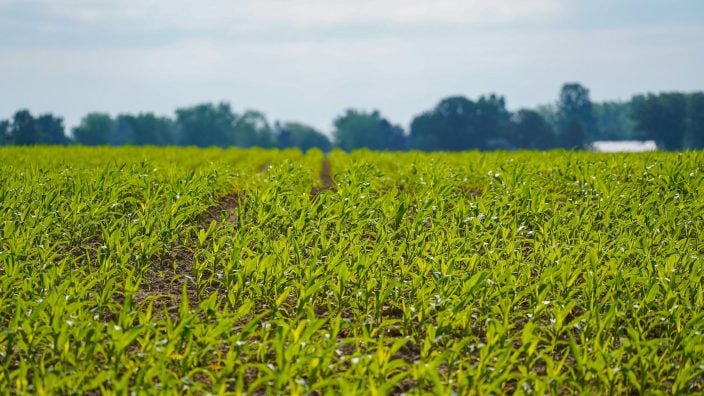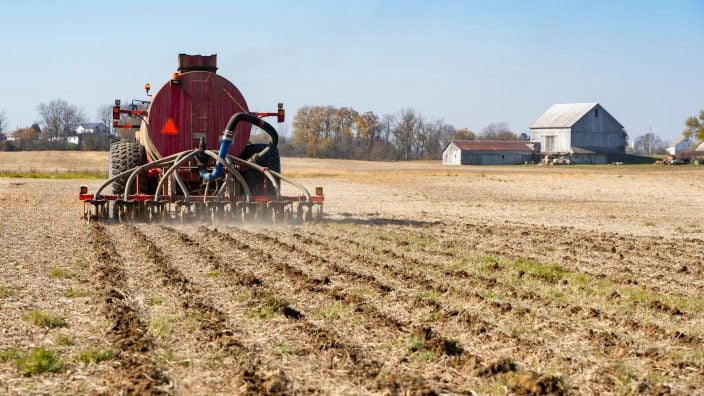Legal with Leah: The questions around data centers
Leah Curtis joins this Legal with Leah to talk about what data centers mean for local communities and how to stay engaged in the development process
Read MoreOn this Legal with Leah, find out more about this contract provision and what you need to look for when entering into an agreement.
As input prices for the 2022 crop production year continue to skyrocket, Ohio Farm Bureau is hearing that some people have had input contracts canceled or changed due to “force majeure.” On this Legal with Leah, find out more about this contract provision and what you need to look for when entering into an agreement.
Listen to Legal with Leah, a podcast featuring Ohio Farm Bureau’s Policy Counsel Leah Curtis discussing topics impacting farmers and landowners.
Ty Higgins [00:00:00] We’re hearing that some people have had input contracts canceled or changed due to force majeure. What is it and what does it do? Leah Curtis joins us for this Legal with Leah. Force majeure. I’ve never heard of this. What is it?
Leah Curtis [00:00:13] Well, it’s a fancy legal term and we like to be fancy and use like Latin words, you know? But what it is is a contract provision, and it usually is used to excuse one or both parties from their obligations in the contract because of some sort of act of God or natural disaster or unforeseeable circumstance. It could be things like labor strikes, war, some sort of major natural disaster or fire, that kind of thing. What it’s generally not is economic conditions. So typically, force majeure can’t be used because markets changed or prices went up because those are kind of generally seen as being foreseeable. I mean, it’s always a chance, right, that prices are going to change or the economy is going to change. But it’s more of those unforeseen events that force majeure is usually applied to.
Ty Higgins [00:01:00] There is a caveat in the language.
Leah Curtis [00:01:02] Yes. So the caveat, as with all contracts, is that the language controls, and oftentimes you can write whatever you want into a contract as long as it doesn’t violate the law or public policy. So the person writing the contract might be able to better define force majeure to include different types of things that may even be economic conditions. It may be supply issues. But, you know, usually we don’t see that. Usually the term is more related to those acts of God or natural disasters. However, it’s always possible. And so that’s why it’s important. Always No. 1, read your contracts. Don’t sign them without reading them, please, and make sure you understand what is in that term when you sign the contract.
Ty Higgins [00:01:40] Force majeure contract provisions may also have notification requirements as well.
Leah Curtis [00:01:44] Yes, so again, this is the choice of the drafter, but usually those provisions will have some sort of notification where whoever’s invoking the clause, whoever is saying, Look, I can’t comply, I can’t do this. It’s not possible. They have to let the other party know, and usually they may have some obligations to try to mitigate that problem, or they may have some specific circumstances of what they’re going to do if they can’t meet those obligations.
Ty Higgins [00:02:07] So what can you do if a vendor notifies you that they’re invoking force majeure?
Leah Curtis [00:02:11] Well, first I would always say, make sure again that you’ve read that contract. Do you understand the language that’s there? If you’re in a dispute, you should consider contacting an attorney, and I know people don’t like to hear that. But this is a situation where that attorney can look at that case. They can look at that contract and say, Is this a valid use of force majeure or not? And if it’s not, then you may have to get into some sort of litigation. But it may not go that way. It might just be a letter. It might just be negotiations between you and the company. But you’re not going to get to that place if you don’t work with an attorney to really help you. So ultimately, if you are at odds, it’s going to be a dispute that may have to go to court and get resolved. And the court will interpret what is or is not within that force majeure contract clause.
Ty Higgins [00:02:53] I know you can’t talk about individual cases directly or maybe phone calls you’ve gotten, but can you give us an example of what you’re hearing out there and how this might be impacting farmers?
Leah Curtis [00:03:01] So I would say right now it’s a rumble. There’s not a lot of specific situations, but we’re hearing, Oh, I heard this or I heard that. I think a lot of it right now, of course, as with everything relates to the supply chain. We’re seeing vast increases in prices for those wholesale articles, which then getting to the farm gate means that there’s also that large increase and maybe somebody has already contracted out a price for that, and now their retailer is coming at them saying, Hey, that price has gone up so much, I can’t lose that much. Again, you have to look at the terms of that contract, but that may not be covered by a force majeure. So you really do have to take some initiative and look at that contract. Make sure you understand what’s in it to know whether that’s a valid excuse or not.


Leah Curtis joins this Legal with Leah to talk about what data centers mean for local communities and how to stay engaged in the development process
Read More

Ohio Farm Bureau advocated for a change in the law to allow family members and employees to handle pesticides while under the supervision of a licensed applicator. The rules around HB 10 are being finalized.
Read More

Four property tax reform bills were signed into Ohio law at the end of 2025. Ohio Farm Bureau Associate General Counsel Leah Curtis breaks down the bills and what the changes mean for Ohioans.
Read More

Learn what the requirements are to legally fly a drone in Ohio as well as steps the Ohio Legislature has taken in terms of security concerns.
Read More

In 2025, about 21 counties are going through a reappraisal or update, and because Ohioans pay taxes one year behind, they will see new property tax bills in January 2026.
Read More

Any unlicensed handlers who use restricted use pesticides will need to have additional training. Farm Bureau will be working on legislation to give employers a choice on how to provide training.
Read More

Current Agricultural Use Value is often discussed as a farmland preservation tool, but there are some other tools in the law that landowners can consider.
Read More

Update: As of Feb. 27, 2025, the Financial Crimes Enforcement Network announced no fines, penalties or enforcement action will be taken against companies based on failure to file or update BOI by March 21.
Read More

Update: As of Feb. 27, 2025, the Financial Crimes Enforcement Network announced they would not issue any fines or penalties or take enforcement action against companies based on failure to file or update beneficial ownership information reports by the March 21, 2025, deadline.
Read More

Update: As of Feb. 27, 2025, the Financial Crimes Enforcement Network announced they would not issue any fines or penalties or take enforcement action against companies based on failure to file or update beneficial ownership information reports by the March 21, 2025, deadline.
Read More